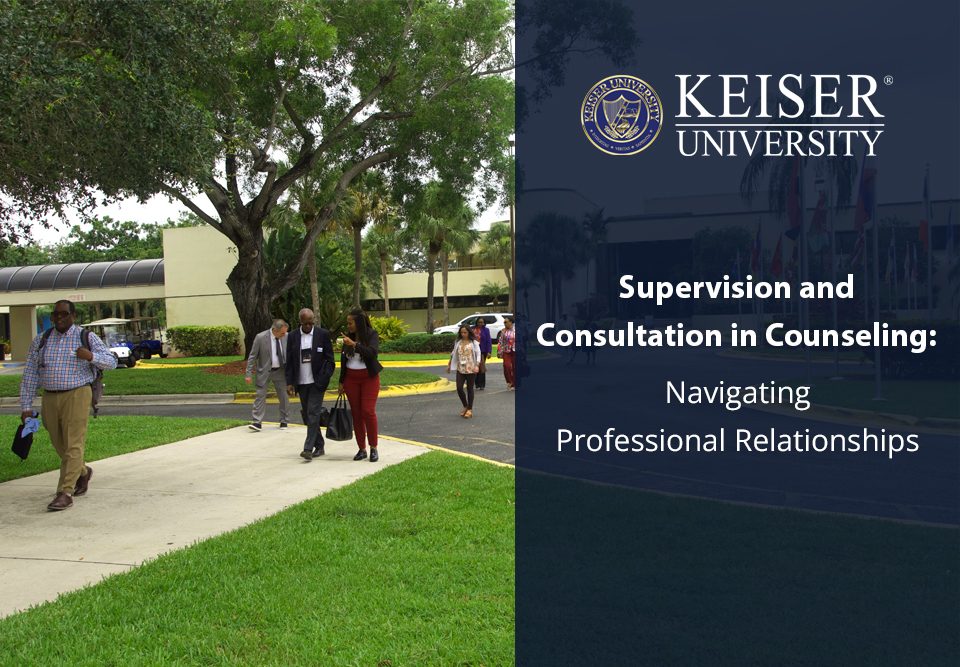Working as a mental health professional requires a mindset of continuous growth, learning and development. One of the many ways in which mental health professionals, including counselors, can grow within their fields is through reflective practice and regular feedback not just from fellow peers, but from direct supervisors as well.
Both counseling supervision and consultation can play an important role in professional development and growth. That said, it is important for mental health professionals to understand the differences and benefits between these two practices.
Understanding the Role of Supervision in Counseling
Before we dive any further into the differences between supervision and consultation in counseling, it is important to understand what clinical supervision entails for mental health professionals. Even though these terms are sometimes used interchangeably, they are actually very different in terms of what they involve and how they can affect a counselor’s professional growth and development.
Defining Clinical Supervision
Specifically, clinical supervision refers to a formal process where counselors are evaluated by a more experienced mental health professional in the field. Clinical supervision is used to ensure that counselors are properly trained and that they are following all legal and ethical obligations in their everyday work. Typically, clinical supervision also involves regular feedback, evaluation and performance reviews, though the frequency of these can vary from one organization to the next.
Types of Supervision in Counseling
There are several different types of clinical supervision in the counseling world, ranging from individual and group supervision to live or video-based methods. Ultimately, each type of supervision offers its own unique benefits and potential drawbacks, and the type that is best for any counselor’s professional growth can vary based on a variety of factors.
Individual vs. Group Supervision
Individual counseling supervision occurs when there is one assigned supervisor to a single counselor. This type of approach ensures that the counselor receives consistent feedback and review from the same person, which can help them stay grounded and may help counselors develop a greater sense of trust.
On the other hand, group supervision may also be used and typically involves having a single supervisor assigned to a group or three or more counselors. This type of supervision may help counselors learn from the experiences of others while making valuable connections. In many cases, group supervision is also much more cost-effective.
Live vs. Video-Based Supervision
Supervision can also be live (in-person) or video-based (also known as telesupervision). Both options can present some unique benefits and possible drawbacks. While in-person supervision and video-based supervision present scheduling conflicts, video-based supervision allows for more flexibility in geography eliminating travel commitments. However, video sessions may miss some of the social context provided by in-person meetings.
Different Models of Supervision in Counseling
In the realm of clinical supervision, there are also many different supervision types that may be drawn upon, with common examples including:
- Psychodynamic supervision
- Person-centered supervision
- Developmental supervision
Ultimately, supervisors will focus on what is best suited to the mental health professional(s) they are overseeing based on their unique strengths, weaknesses and goals.
Consultation Process in Counseling
In addition to formal supervision, consultation also maintains an important relationship in counseling for mental health professionals who want to continuously grow and improve. Specifically, it is important for counselors to understand how counseling differs from formal supervision and the benefits of seeking out consultations on an as-needed basis.
What Is Consultation in Counseling?
Specifically, consultation in counseling refers to a voluntary practice where mental health professionals collectively share their experiences, advice questions and concerns among themselves. Consultation may occur in a group setting, or it may be a one-on-one conversation.
Purpose of Seeking a Consultation
There are many reasons to consider seeking a consultation with another counselor or mental health professional. Often, counselors will seek out consultation when they are in the process of navigating a challenging issue in their work or looking for ways to improve a certain skill, such as conflict resolution or self-awareness.
Clinical consultation is incredibly important for counselors because not only can it assist with professional growth, but it can also help counselors provide better care to their patients. Meanwhile, consultations can help counselors build a sense of community within their own professions while promoting continuous learning that is so critical in the dynamic mental health field.
Building Effective Supervisory Relationships
For supervisors and supervisees alike, there are some important best practices to keep in mind when it comes to building healthy and productive clinical supervisory relationships. This includes establishing clear expectations, leveraging communication skills and knowing how to handle conflict when it arises.
Establishing Clear Boundaries and Expectations
First, supervisors must understand how to set up clear expectations from the very beginning. Clinical supervisors should establish formalities, such as how often they will be meeting with counselors to provide feedback, how these meetings will be conducted and which areas they will be evaluated on.
Communication Skills for Effective Supervision
Clinical supervisors also have a responsibility to sharpen their verbal and written communication skills as they take on this important role. Supervisors need to make sure that they are accessible to counselors who may have questions or concerns about the feedback process, and they need to be able to address delicate issues appropriately.
Handling Conflict in Supervisory Relationships
Conflict is not uncommon in supervisory relationships, and this is no exception in the world of mental health work. When issues do arise between counselors and their clinical supervisors, there should be specific conflict resolution protocols in place that should be closely followed to protect the integrity of the relationship.
Ethical Considerations in Supervision and Consultation
Clinical supervision and consultation both involve important ethical considerations, especially regarding confidentiality and reporting obligations. For example, HIPAA laws mandate that patient information should be kept confidential, with the APA emphasizing that “for people to feel comfortable talking about private and revealing information, they need a safe place to talk about anything they’d like, without fear of that information leaving the room.”
With this in mind, counselors must be careful about what information they share both with supervisors and fellow mental health workers in consultations. It is also worth noting that patient confidentiality laws can vary greatly from one state to the next, so this must be taken into consideration in clinical supervision and consultation scenarios as well.
Best Practices for Supervisors in Counseling
Clinical supervisors in mental health settings can best serve counselors by following some basic best practices in their work, particularly as they relate to providing feedback, fostering a safe learning environment and encouraging professional growth.
Providing Constructive Feedback
First, clinical supervisors should understand how to provide feedback that is supportive and constructive, drawing on evidence-based strategies and accepted field methods to support their recommendations. In doing so, counselors can more readily make changes to their own methods and work on improving their clinical skills.
Fostering a Safe Learning Environment
Perhaps above all else, clinical supervisors must focus on creating an environment that is safe and conducive to learning. This includes building strong working relationships with supervisee counselors, ensuring that they feel comfortable sharing their own experiences and challenges.
Encouraging Self-Reflection and Growth
Great clinical supervisors are those who can encourage their supervisees to constantly work toward improvement and to never be satisfied with being in the same place. With the right strategies and supervising methods in place, it is possible to create an environment that truly fosters and encourages self-reflection and professional growth at all times.
Benefits of Supervision and Consultation for Counselors
Counselors stand to benefit from both clinical supervision and consultation in a number of ways, provided that these sessions are carried out properly.
Enhancing Clinical Skills and Competency
Both supervision and consultation can be extremely effective in helping mental health professionals improve their own clinical skills and boost their overall competency. Supervision and consultation with other counselors gives professionals a platform to share their own experiences, ideas and challenges in an environment that is supportive and that lends to growth, which in-turn benefits patients as well.
Preventing Burnout and Promoting Self-Care
Mental health professionals, including counselors, tend to experience high rates of burnout in their careers. The everyday stresses of this type of work can compound when counselors feel like they themselves have nobody to talk to or commiserate with. Clinical consultations provide a much-needed outlet for many mental health professionals to speak with other providers as a form of self-care, which can prevent burnout.
Staying Updated With the Latest Research and Practices
Clinical supervision and consultation can also be valuable sources of information for counselors who want to stay up to date on the latest industry research, innovations, trends and best practices. With the continuous dialogue and conversation that these feedback methods provide, mental health professionals can stay up to speed on the topics that matter most.
Preparing for Supervision and Consultation Sessions
Whether you are a counselor preparing for a clinical supervision session or an information consultation meeting, there are a few tips you can keep in mind to get the most out of your session.
Setting Goals and Expectations
First, take the time to set some realistic goals and create your own set of expectations for what you would like to get out of the meeting. Is there a specific topic that you want to discuss or a certain issue you are experiencing that you would like feedback about? You might even consider writing these down so that you do not forget about them during your meeting.
Documenting and Reflecting on Sessions
Meanwhile, it can also be helpful to reflect on your consultation and supervision sessions immediately after they occur. This can be a great way to assess how helpful or useful each session was to you and what you may have received from it. This is something you can document in writing or simply set aside a few minutes to think about. Regardless, this type of reflection can be helpful in shaping future sessions.
Seeking Feedback and Continuous Improvement
At the end of the day, it is important to remember that clinical supervision and consultation are all about getting constructive feedback from others and working toward constant professional development. With this in mind, mental health professionals are encouraged to enter these sessions with an open mind and with the mindset that they are there to better themselves.
Ready to Learn More?
Both supervision and consultation are important feedback techniques for counselors who want to grow professionally and improve their own clinical skills. With these techniques in place, mental health professionals can stay on top of the latest research and best practices in the field while learning from others and even participating in some critical self-care.
If you are looking for more ways to grow professionally, then it may be time to consider a graduate degree from Keiser University. We offer a wide range of programs geared toward counselors and mental health professionals, including some online programs to accommodate your scheduling needs. Reach out to learn more about our graduate school or get started with your online application today!






 The instructors at Keiser University impacted my life. They believed in my ability to become a great graphic designer, regardless of how I felt about my skills. KU helped to prepare me for the real world and got me to where I am today.
The instructors at Keiser University impacted my life. They believed in my ability to become a great graphic designer, regardless of how I felt about my skills. KU helped to prepare me for the real world and got me to where I am today.
